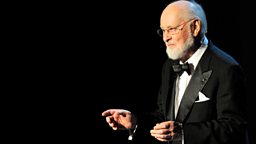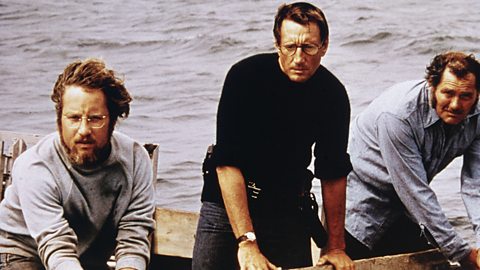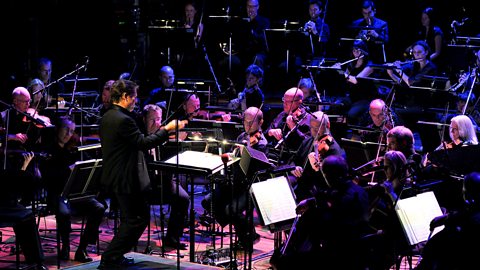10 awe-inspiring film scenes soundtracked by John Williams

“Without question, John Williams has been the single most significant contributor to my success as a filmmaker.” So said Steven Spielberg, who has enjoyed a staggeringly successful 26-film partnership with the composer, beginning with 1974’s The Sugarland Express. The following year’s Jaws changed both their lives. Williams’s terrifying score was quickly followed by Star Wars, Close Encounters of the Third Kind, Superman the Movie, Raiders of the Lost Ark and E.T. the Extra-Terrestrial, soundtracking the box-office bonanza that transformed Hollywood, and reviving the art of orchestral film music.
The Harry Potter series introduced Williams to a new generation, and the quintuple Oscar winner is currently scoring Star Wars Episode VIII: The Last Jedi. As Williams turns 85, Friday Night Is Music Night is devoted to a concert of his work, recorded live by the BBC Concert Orchestra at Watford Colosseum in January. As an extra treat all Williams fans can experience three of the pieces recorded for Friday Night is Music Night in a whole new way - play with the mix and watch Jaws, Star Wars, and Jurassic Park now.
Here, Nick Hasted revisits some of the many memorable movie moments that have been soundtracked by a John Williams theme.
1. Theme from Jaws

Excerpt of Main Theme from Jaws performed by the BBC Concert Orchestra
The sound of many a ruined swim at the beach.
“I thought he was pulling my leg,” Spielberg said of first hearing Williams play Jaws’ two-note motif on the piano. "He played it until I stopped laughing.” Williams’s music took the place of a shark mostly left unseen, building a sense of motiveless terror. Director and composer are most brilliantly in tandem for the scene where Police Chief Brody (Roy Scheider) keeps watch on a packed summer beach for a beast only he believes in. The ambient sound of a radio, nagging citizens and kids splashing and screaming at play distract him. Then, with the camera situated beneath the water, the low pulse of bass and cello begins. A harp is introduced, like the horribly graceful swish of a tail. The tempo remorselessly accelerates, tuba and trombones adding weight, till it hits a frenzied peak as the camera swoops between the legs of the splashing children and blood clouds the water. Sickly horror movie strings match Brody’s reaction, as Spielberg’s camera drops back vertiginously. Then the eerie calm of lapping waves returns. Williams had reduced the film to its visceral, man-eating essentials.
2. Star Wars (1977): Han and Luke receive a heroes’ welcome

Star Wars quickly replaced Jaws as the all-time box-office champ in 1977. Williams's iconic score is immediately to the fore during its famous scrolling prologue, his succession of fanfares suggesting the chivalrous deeds, thrills and glory to come. The composer is there again at the finale, soundtracking the film's almost wordless last six minutes, as Luke Skywalker, Han Solo and Chewbacca walk through cheering throngs to receive their heroes' medals from Princess Leia. Hinting at Mendelssohn's Wedding March at first, the film’s musical motifs are nostalgically recalled, climaxing in the surging romance of the main theme’s brass, sending the audience out on a high as the credits roll.
3. Close Encounters of the Third Kind (1977): the Mothership speaks
[Warning: Third-party content may contain adverts]
Williams’s second film of 1977 was the year’s second-biggest hit. Using a favourite technique, his five-note theme built in prominence through the film. “The entire last 25 to 30 minutes… I opened the shots up so John would be able to create a more operatic sound,” Spielberg revealed during an American Film Institute masterclass. The director’s benign inversion of the alien invasion films he’d grown up with hinged on Williams’s music, as the visitors’ Mothership uses those five notes to communicate with its nervous hosts, first blowing their speakers with a blast of tuba, then building in orchestral grandeur. Williams even slips in a sly hint that first contact is about to go pear-shaped, as the Mothership booms two Jaws-style bass-notes, and the watching scientists’ eyes widen with fear.
4. Superman the Movie (1978): Superman turns back time to save Lois

Richard Donner was the next director to tap Williams for a Star Wars-style anthem, fit for America’s greatest superhero. His main theme’s rush of strings followed by a soaring brass fanfare made you believe a man could fly more than the special effects. But Williams was also at his most poignant when Lois Lane is killed in an earthquake, and a raging Superman refuses to accept her fate, pushing his powers to their limit to save her. Angry brass accompanies him as he roars into the sky, lightning crashing and brass slowing then speeding up as he flies around the planet at time-warping speed, and the broken earth reforms. The main theme is dropped in as encouragement for his feat, while a reprise of Superman’s Love Theme signals renewed hope before the resurrected Lois stirs.

Excerpt from the Love Theme from Superman
The BBC Concert Orchestra perform a John Williams classic.
5. Raiders of the Lost Ark (1981): Indiana Jones’s first narrow escape
[Warning: Third-party content may contain adverts]
Spielberg directed the chase scenes in Raiders of the Lost Ark “for Johnny”, as he recalled to the AFI. This Lucas-Spielberg team-up paid even more blatant homage than Star Wars to the Saturday morning adventure serials of their youth. This was made clear in its long opening sequence of cliff-hanging escapes for Harrison Ford’s Indiana Jones and, as he had in Jaws and Star Wars, Williams’s music set the mood from the start. It shadows Indy’s every anxious move, strings tiptoeing with him as he grasps a golden idol, deep drums rumbling as a rolling stone nearly crushes him, pizzicato strings low and quick as he’s chased by a tribe. Finally, another memorably triumphant, marching brass theme soars away with him on a plane.
6. E.T. the Extra-Terrestrial (1982): the flying BMX chase
[Warning: Third-party content may contain adverts]
Spielberg’s devotion to his composer reached new heights on 1982’s E.T. the Extra-Terrestrial. Its final 15 minutes are one long, exhilarating chase scene. Williams’s attempts to conduct his score for it in one go kept missing moments in the film it had to match with. Remarkably, Spielberg told him just to play and he’d edit his film to Williams’s music. Perhaps that explains the huge highs and lows of E.T.’s climax, as the boy Elliott and his friends race to help the alien escape the US government on BMX bikes. Urgent brass signals danger as agents pile in behind them, and Elliott closes his eyes as all seems lost. Then Williams throws in all the epic sentimentality he’s got: drums triumphantly crash and the whole orchestra rises with the boys as E.T.’s powers lift them into the air.
7. Schindler's List

Excerpt from Theme from Schindler's List
A performance of one of John Williams' most recognised and emotional works.
“When he [Spielberg] showed me Schindler’s List,” Williams told The Guardian, “I was so moved I could barely speak. I remember saying to him, ‘Steven, you need a better composer than I am to do this film.’ And he said, ‘I know, but they’re all dead.’” Williams responded with a melancholy violin theme heavily resonant of European Jewish music. It’s mostly an undercurrent, sometimes orchestrally bolstered, as Oskar Schindler (Liam Neeson) agonises that he “could have got more out” and crumples to the ground in front of some of the Jews he saved from the camps.
8. Jurassic Park (1993): T. Rex turns on the raptors
[Warning: Third-party content may contain adverts]
Williams and Spielberg’s mutual versatility was proven in their second film of 1993. As the heroes of Jurassic Park tumble down dinosaur skeletons pursued by raptors, strings giddily spiral and brass skips down with them. Then, with a trademark Williams brass fanfare, the Tyrannosaurus Rex bursts into the frame. The one-sided battle that follows pays tribute to the 'dynamation' of Ray Harryhausen (special effects king behind the Sinbad films and One Millions Years BC), as the real king of the dinosaurs roars along with Williams’s theme.
9. Saving Private Ryan (1998): Captain Miller's last stand
[Warning: Third-party content may contain adverts, contains adult themes and imagery]
Spielberg’s gripping recreation of D-Day and its aftermath ends with Private Ryan saved, but Captain John H. Miller (Tom Hanks), dying. As the light leaves Miller’s eyes, and he gasps to Ryan, “Earn this”, Williams provides a trumpet elegy. Then, as a reading of the Army’s letter to Ryan’s mother offers a consoling quote from Abraham Lincoln (a future Spielberg-Williams subject), rousing strings assure us that this war’s sacrifice was nobly worthwhile.
10. Harry Potter and the Philosopher’s Stone (2001): Harry goes to Hogwarts

While engaged to score all three Star Wars prequels, a new box office-busting franchise also turned to Williams. Hedwig’s Theme, with its eerie xylophone introduction and witch-flight swirl of strings, became as familiar as Star Wars to a vast new audience. It’s included in Harry’s first ever journey from Platform 9 ¾ on the Hogwarts Express, with brass and choral embellishments as he approaches Hogwarts’ grand halls.

